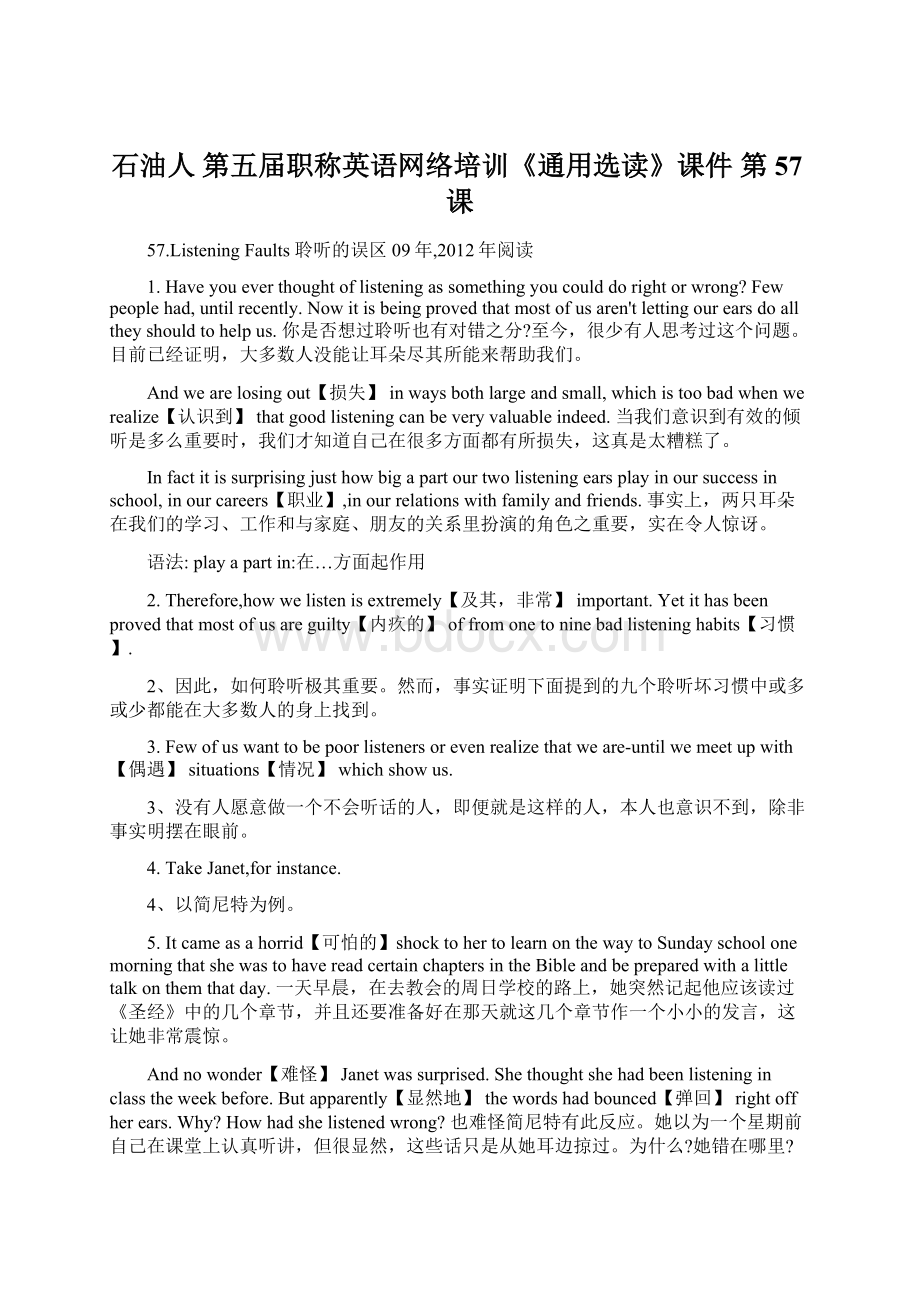石油人 第五届职称英语网络培训《通用选读》课件 第57课.docx
《石油人 第五届职称英语网络培训《通用选读》课件 第57课.docx》由会员分享,可在线阅读,更多相关《石油人 第五届职称英语网络培训《通用选读》课件 第57课.docx(6页珍藏版)》请在冰豆网上搜索。

石油人第五届职称英语网络培训《通用选读》课件第57课
57.ListeningFaults聆听的误区09年,2012年阅读
1.Haveyoueverthoughtoflisteningassomethingyoucoulddorightorwrong?
Fewpeoplehad,untilrecently.Nowitisbeingprovedthatmostofusaren'tlettingourearsdoalltheyshouldtohelpus.你是否想过聆听也有对错之分?
至今,很少有人思考过这个问题。
目前已经证明,大多数人没能让耳朵尽其所能来帮助我们。
Andwearelosingout【损失】inwaysbothlargeandsmall,whichistoobadwhenwerealize【认识到】thatgoodlisteningcanbeveryvaluableindeed.当我们意识到有效的倾听是多么重要时,我们才知道自己在很多方面都有所损失,这真是太糟糕了。
Infactitissurprisingjusthowbigapartourtwolisteningearsplayinoursuccessinschool,inourcareers【职业】,inourrelationswithfamilyandfriends.事实上,两只耳朵在我们的学习、工作和与家庭、朋友的关系里扮演的角色之重要,实在令人惊讶。
语法:
playapartin:
在…方面起作用
2.Therefore,howwelistenisextremely【及其,非常】important.Yetithasbeenprovedthatmostofusareguilty【内疚的】offromonetoninebadlisteninghabits【习惯】.
2、因此,如何聆听极其重要。
然而,事实证明下面提到的九个聆听坏习惯中或多或少都能在大多数人的身上找到。
3.Fewofuswanttobepoorlistenersorevenrealizethatweare-untilwemeetupwith【偶遇】situations【情况】whichshowus.
3、没有人愿意做一个不会听话的人,即便就是这样的人,本人也意识不到,除非事实明摆在眼前。
4.TakeJanet,forinstance.
4、以简尼特为例。
5.Itcameasahorrid【可怕的】shocktohertolearnonthewaytoSundayschoolonemorningthatshewastohavereadcertainchaptersintheBibleandbepreparedwithalittletalkonthemthatday.一天早晨,在去教会的周日学校的路上,她突然记起他应该读过《圣经》中的几个章节,并且还要准备好在那天就这几个章节作一个小小的发言,这让她非常震惊。
Andnowonder【难怪】Janetwassurprised.Shethoughtshehadbeenlisteninginclasstheweekbefore.Butapparently【显然地】thewordshadbounced【弹回】rightoffherears.Why?
Howhadshelistenedwrong?
也难怪简尼特有此反应。
她以为一个星期前自己在课堂上认真听讲,但很显然,这些话只是从她耳边掠过。
为什么?
她错在哪里?
6.Thereareaboutninewaysoflisteningthatnetusnothingbut【只有】trouble,accordingtoDr.RalphNicholsoftheUniversityofMinnesota.明尼苏达州立大学的RalphNichols博士认为,有9种聆听的情形给人们造成麻烦。
Ifwerecognize【认出】andtrytoconquer【克服】them,wecanstepup【增加】ourlisteningabilitybyabouttwenty-fivepercentandthereby【因此】greatlyincreaseourchancesforsuccessinourdailylives.如果认识到并且努力克服它们,我们的聆听能力就能提高25%,从而大大增加我们在日常生活中成功的机会。
7.Unlessyouareveryunusualindeed,saysDr.Nichols,youmustplead【承认】guiltytoseveralofthefollowingbadlisteninghabits:
7、RalphNichols博士认为,除非你非常特殊,否则的话,你一定会承认自己有下面提到的坏习惯。
8.Daydream【白日梦】Listening:
Youcanthinkaboutfourtimesasfastastheaverage【平均的】personspeaks.Soyouhavequiteabit【相当多】ofspare【多余的】thinkingtimewhilewaitingforthewordstocomein.白日梦式聆听:
人思考的速度比平均的说话速度快4倍。
因此,在等待别人说出下一句话时,你会有一段空余的思维时间。
Unconsciously【无意中,不知不觉】,youusethistime,ifyouareapoorlistener,toletyourthoughtsdrift【漂流,漂浮】elsewhere.如果你是一个差劲的聆听者,你的思绪就会不知不觉地在这段时间飘走。
9.Forinstance,yourteacherisgivingyousomebackground【背景】materialonAmericanhistory.Yourmindiswithhimatfirst.比如说,你的老师正在讲述美国历史的背景资料。
起初你注意地听着;
Thenotherthoughtsdriftintothatsparethinkingspace.Withoutwarning【前兆】,theyhavetakenoveryourmindentirely【全部地】.之后,其他的念头就会进入那段空余的思维时间;然后在没有任何预兆的情况下,完全占据你的整个大脑……
Imustn'tforgettogodowntown【商业区】afterschoolforMother.Ifonly【要是…就好了】mybikewasfixed!
MaybeIcangetJoetocomeover【顺便来访】Saturdayandhelpme.“一定别忘记放学后替母亲进城办事”。
“要是我的自行车修理好了该多好!
,“也许能让Joe星期六过来帮我……”
Yourthoughtsdrift【漂流,漂移】on.Suddenly,withajolt【震惊】,youhearthesewords:
"Nowwe'llhavealittletestonwhatIhavebeenexplaining."Ouch!
你的思绪就这样漫无目的地飘荡,突然间,你听到这样令人震惊的话:
“现在,就我刚才讲的进行一个小测验。
”真糟糕啊!
语法:
1.takeover=接管;takein=接受,吸收;takedown=写下,记下;taketo=喜欢;takeon=承担,从事;takeoff=脱下,起飞;
10.Sowhattodotokeepdaydreamsfromfiltering【过滤】in?
Onewayistoputthatextrathinkingtimetowork-onthesubject.那么,怎样做才能控制“白日梦”钻进来呢?
一个方法是把这些多出来的思维时间用来考虑一些跟主题有关的事。
Sumupwhatthespeakerissaying;lookformajorpoints.Pretend【假装】youaregoingtohavetorepeathisideas.Puthiswordsintoyourwords.例如,概括一下发言人说的话;找出他的发言要点;假定你要重复他的观点,将他的话用自己的方式重新复述一遍。
Itisn'teasy.Ittakeseffortandtimetolearn.Buttheresultsaresuretosurpriseandpleaseyou.要做到这些并不容易,你必须付出时间和精力去学习。
但是,结果肯定是出乎意料和愉快的。
11.Shut-EarListening:
Maybeyoufeelyoualreadyknowwhatthespeakerisgoingtosay.Orhissubjectcouldn'tinterestyouless.充耳不闻式聆听:
可能你觉得早已经知道发言者将要说什么;或者,他讲的主题根本不能吸引你,
Youturnoffyourears-andwhoknowswhatyoumaybemissingorwhenalittleknowledgeonthatsubjectmaycomeinmighty【非常,强大的】handy【方便的,便利的】?
Anyway,whytaketherisk?
因此你“关闭”了耳朵-那么,谁知道你可能错过了什么?
谁又知道什么时候他讲的可能会派上用场?
不管怎样,为什么要冒这样的风险呢?
12."That's-What-You-Think"Listening:
Youhaveyourownpet【得意的】ideasoncertainsubjects.Youdon'tliketohearanythingwhichmightmakeyouquestionthem.内心排斥式聆听:
对于某些主题你会有自己的观点,就不愿意听到与之相左的见解。
Sowhenanyonebeginsarguingontheotherside,yousimplystoplistening.Insteadyouplanwhatyouaregoingtoanswer.因此,当别人开始陈述与你相反看法时,你干脆不再听。
只是思考着自己该怎样回应。
Anyonewhorefusestoooftentolistentotheothersideofaquestionrisksbecomingnarrow-minded【思想狭隘的】-anexasperating【激怒人的】andunattractive【讨厌的】trait【特征】intheotherfellow.那些经常拒绝倾听对立意见的人往往会变得思维狭窄-这在别人眼中是一种令人恼怒和厌烦的表现。
Isitanymorebecomingtoyou?
Nothanks,yousay,anddecidetoheartheotherfellowout.Maybeheisright.Maybeyouare.你现在还想成为这样的人吗?
你会说,当然不。
然后决定去认真地听完别人的阐述。
可能他是正确的,也可能你是正确的。
Butyoucangivehimabetterargumentonyourviewpointifyouhearwhathesays.但是,如果你听了他的观点,你就可以用自己的观点更好地去反驳他。
13.Fake【假的】Listening:
Youpretendtobegivingcloseattention.Youtoss【摇摆】inafewnodsandyesesattherightmoments,youhope.佯装式聆听:
你假装在注意听;还期望自己在恰当的时刻能够点头附和。
Thisisacommonfaulty【有错误的】listeninghabitthatfoolsnoone.Youreyesgiveyouaway【泄露】,ifyourabsent-minded【心不在焉的】answersdon't.这种常见的坏的聆听习惯欺骗不了任何人。
即使那些不着边际的回答没露馅,你的眼睛也会出卖你。
Andcanyouthinkofanythingmoreinfuriating【令人发怒的】thantobegiventhesametreatment?
有什么能比受到(听众)这样的对待更让人生气呢?
Also,itisextremely【及其,非常】difficulttorespondsatisfactorilytowordsyoudidn'thear.Goodconversations,ifnotfriendships,havebeensacrificed【牺牲】tothishabit.
而且,对自己没有认真聆听的问题做出满意的回答是极其困难的。
这样一个坏习惯让你失去的可能不仅仅是交流,甚至可能是与别人的友谊。
14.Over-My-Head【不好理解】Listening:
Youareconvinced【使确信】thatthesubjectisbeyondyou,soyoudepart【离开】,atleastinspirit.Youmayberight.Andthenagainyoumaybewrong.不知所云式聆听:
你确信正在谈论的主题超过了你的理解范围,于是你起身离开,至少也是心猿意马。
你可能做的对;但你也可能是错的。
Ifyouletthewordsenteryourmind,youmaybesurprisedtodiscoverthattheymakesense.ButeveniftheyareasstrangeasGreektoyou,youshouldtrytolistenandunderstand.如果你用心去听,就可能会惊讶地发现这些话很有道理。
即使这些词句像希腊语般晦涩难懂,你还是应该尽力去聆听和理解。
Otherwiseyoumayfindsomedaythatyoumustattempt【试图】tograsp【理解,领会】anover-your-headideaandbetotallyunableeventotry.否则有一天你会发现自己处在这样一种境地:
必须要听懂某些艰深的内容,但自己却连基本的能力都没有。
语法:
convincesbofsth:
使某人相信;
convincethat:
使某人相信;
Helefttheroom,convinced/believingthatawarwouldcome.
作状语的形式
15.MemoryTestListening:
Somepeoplethinkthattryingtomemorize【记住】aseriesoffactsisgoodlistening.Theyarewrong.记忆测试式聆听:
有人认为有效的聆听就是将所有的细节都记住。
他们错了。
Forinstance,youaregettingastoryforyourschoolpaperonanassembly【集会】speaker.Hemakesaseriesofpoints.Youtrytomemorizethem.比如,你想从某人的大会发言中为自己的论文汲取素材。
他罗列了很多点,你努力去记住它们。
ButwhileyouarebusyplantingfactsA,B,andCinyourmind,repeatingthemoverandover,youarelosingoutonfactsDandE.Bettertolookformainideas.Youwillfindthemmoreusefulandeasiertorecall【回忆】later.当你忙着重复一条条观点,想把它们牢牢地记在脑子里时,却恰恰忽略了其余内容。
最好的方式是抓住要点,你会发现它们更有用,而且更容易帮助你回忆。
16.Take-It-All-DownListening:
Whenyoutrytogettoomanyofthespeaker'swordsonpaper,partofyourmindmustbeconcernedwith【关心】yournote-taking.全部记录式聆听:
当你奋力记录说话人的尽可能多的词句时,一部分注意力必然会集中在“笔记”之上。
Youareunabletoconcentratefullyonwhatheissaying.Yourisklosingvaluablepoints.因此,你不会全力倾听,就可能错过有价值的信息。
Wherenote-takingisnecessary-andyoumaybesurprisedtofindouthowoftenitisn'tifyouconcentratefullyonlistening-trytojotdown【匆匆记下】onlyamemory-joggingwordortwo.Orputthemainideasonpaperafterthespeakerhasfinished.如果你全神贯注地听,并不时记下一两点内容以帮助记忆,你会惊讶地发现,并不是所有的东西都需要记录,甚至可以在演讲结束后再记下要点。
Themorecomplete【完整的】attentionyougivethespeaker,theeasieritwillbetorecallhisideaslater.
对发言者的关注越多,事后就越容易回忆起他的主要观点。
语法:
1.take/runarisk:
冒险;
attheriskof:
冒…的危险,处于危险中;
17.Personality【个性】Listening:
Youbecomesoconcernedwiththewaythespeakerlooksorhowhetalksthatwhathesaysfailstopenetrate【渗透,了解】.关注个人式聆听:
过分关注讲话者的长相或是他说话的方式,那么他所说的内容就很难入心。
Perhapsunconsciously【下意识地】youdecidethatapersonwhodressesorspeakslikethatcan'thavemuchtosay.Thatcouldbeaveryfalseconclusion.Whoknowswhatyoumaybemissing?
也许你会下意识地认为这样穿着或这样讲话的人不会说出什么有见地的话来。
这样的结论实属错误。
谁能知道你会错过什么?
It'stheoldstory:
youcan'tjudgeagiftbythepackage.Bettertojudgehimafteryouhaveheardhimout【听完】.
俗话说,不要从包装来判断礼物的价值(人不可貌相)。
最好在倾听完之后再作评价。
18.Half-An-EarListening:
Oftenothersoundscompete【竞争】foryourattention-andwin.半个耳朵式聆听:
常常会有其他的声音来吸引你的注意力--还占了上风。
Yourfathergivesyoualistoferrands【差事】.Buthisvoicemustcompetewith,say,yourfavoritesongontheradio.比如,父亲正在给你交待要办的事情,他的声音不得不与收音机里传来的你最喜欢的歌声相抗衡。
Later,youfindthathalfanearwasn'tenough.Youdidn'tlistentoyourfather'swordscloselyenoughtohearandrememberthem.Youhavetotelephonehomeforarepeatperformance.Andyoucan'treallyblameyourfatherforbeingirritated【恼怒的】.后来你发现这样“半个耳朵听”根本不行,因为你没有听到并记住父亲的话,于是只能打电话回家再次询问。
你实在不能责怪父亲为此发火。
Bettertoturnofftheradio,shutthedooroncompetingnoises,ifpossible.Ifnot,guardagainst【避免,预防】yourtendency【倾向】tolistentodistracting【分散,分心】sounds.如果可能,最好关掉收音机、关上门挡住繁杂的噪音。
如果不可能,管住你自己不要被这些声音所吸引。
19.Sotherearetheforces-somewithinourselves,someoutside-thatworkagainstusinoureffortstolisten.所以,某些因素-既有内在的,也有外在的--总是阻碍我们去全力倾听。
Butonce【一旦】welearnwhattheyareandhowtofightthem,wearewellonourwaytogettingridof【除掉,摆